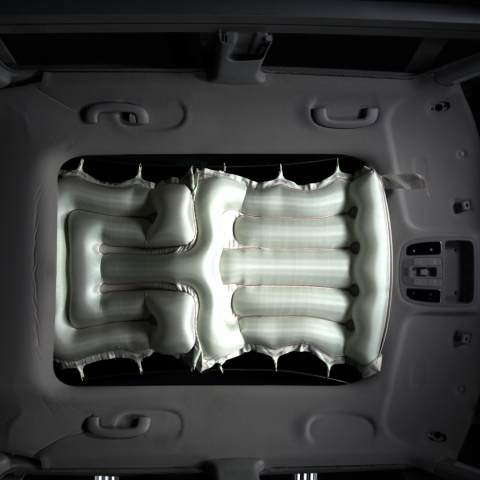SEOUL, South Korea--(BUSINESS WIRE)--Hyundai Mobis (KRX:012330) successfully developed the world’s first panorama sunroof airbag system. This airbag is a safety device that reduces injuries by preventing the body of the passenger from being thrown out of the car through the sunroof in a rollover accident.
Hyundai Mobis completed road test and reliability tests this month, including heat resistance and vibration resistance tests, and it has secured mass production technology. The panorama sunroof airbag has not previously been applied to mass-produced vehicles.
This technology is significant in terms of securing advanced technological competency in airbags by Hyundai Mobis. Since the company began mass-producing airbags back in 2002, Hyundai Mobis has showcased cutting-edge airbag technologies including the 4th generation advanced airbag and the inter-passenger airbag. It’s the first time that Hyundai Mobis has acquired a mass-production airbag technology ahead of its competitors.
The panorama sunroof is a convenience feature that enables passengers in the backseat to enjoy an open view. It’s made from special tempered glass to expand the openness of the existing sunroof. According to several resources, as of 2015, the global market for sunroofs for automobiles is worth about 6 billion USD, and is expected to grow by about 11% on average every year until 2022.
As the sunroof airbag prevents the passenger from spilling from the car in a rollover accident, it can reduce the risk of sustaining serious injuries. In a road test using dummies, when the airbag was deployed, it prevented the passenger from being flung out of the car and cushioned the impact on the head. Serious injuries likely to result in the death of the passenger were reduced to minor injuries.
The panorama sunroof airbag is installed inside the sunroof, and deployed forward from the rear of the car. It resembles the curtain airbag that is deployed alongside the windows of the vehicle in a broadside collision. If the turning angle of the vehicle is changed due to rollover, the sensor detects it, and the inflator deploys the airbag. The airbag cushion inflated by the gas covers the entire roof surface of the vehicle in only 0.08 seconds and protects the passengers.
The structure of the sunroof airbag is more complex than that of ordinary airbags. It has more technological difficulty, so to speak. As this airbag is in the sunroof system, it is important to secure enough space for stable airbag deployment when making the sunroof. What’s more, it must be deployed safely in a way that fits the situation, e.g. when the sunroof screen is open or closed in an accident. If the car is overturned when the sunroof is closed, the airbag is deployed across between the sunroof glass and the sun shield.
Due to this technological difficulty, the technologies developed by overseas airbag manufacturers have remained at the conceptual level. Hyundai Mobis applied 11 patents in the process of developing this technology and gained a competitive advantage over its rivals in terms of technology.
“We announced this technology at a global automotive safety conference held in the US in June, and attracted the attention of major institutions related to road safety and industry officials in the US,” said a Hyundai Mobis official. “We will focus on premium SUV models and become a global leader in advanced airbags.”
About Hyundai Mobis
Hyundai Mobis is a global tier-1 automotive supplier. It was established in 1977, and is headquartered in Seoul, Korea. The corporate philosophy is to become a lifetime partner with technologies for automobiles and people.
Hyundai Mobis currently employs over 30,000 people. Manufacturing operations are in over 30 locations in 10 countries, including Korea, China, and the U.S. Products include automotive modules (chassis, cockpit and front-end), brakes, suspensions, airbags, lamps, and automotive electronics. R&D headquarters are in Korea with 4 technical centers worldwide, Germany, China, India, and the U.S.
Hyundai Mobis has mass-produced a great number of ADAS technologies and green car components. For more information, please visit the website (http://en.mobis.co.kr)




